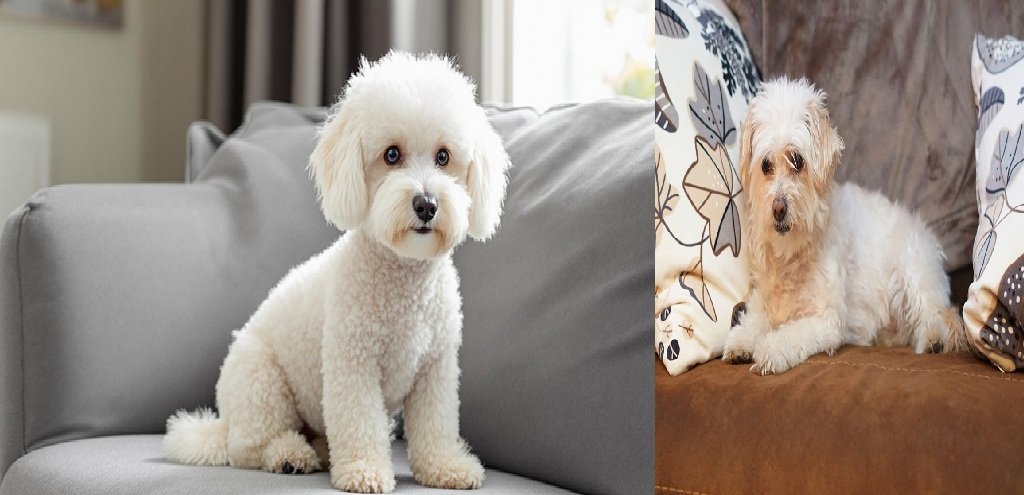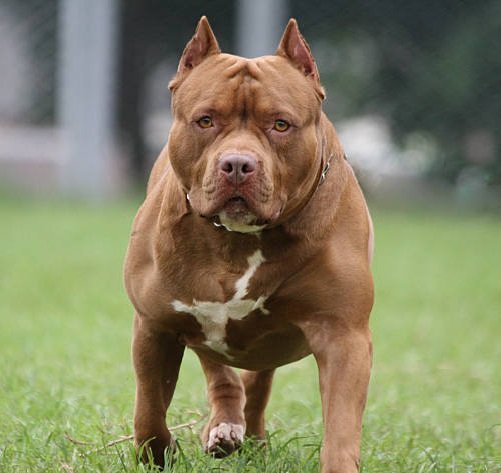The Bichon Poodle, often known as the Bichpoo, is a crossbreed between the Bichon Frise and the Poodle, two popular dog breeds known for their friendly nature and hypoallergenic coats. While Bichon Poodles tend to be happy and healthy dogs, like any breed, they are not immune to health problems. Understanding these potential issues is essential for dog owners who wish to ensure a long, happy life for their furry companion.
This article will explore the common Bichon Poodle health problems, the causes, symptoms, and how to prevent or manage them. By being proactive, you can help your Bichon Poodle lead a healthy, active, and comfortable life.
Common Health Issues in Bichon Poodles
1. Hip Dysplasia
Hip dysplasia is a genetic condition where the ball and socket of the hip joint do not develop properly. It is common in larger breeds but can also occur in small dogs like the Bichon Poodle.
- Symptoms: Limping, difficulty standing, reluctance to jump or climb stairs.
- Causes: Genetics, obesity, rapid growth during puppyhood, or injury.
- Prevention: Regular exercise and maintaining a healthy weight can help prevent this condition. It’s also essential to choose a responsible breeder who tests for hip dysplasia in the parent dogs.
2. Patellar Luxation
Patellar luxation is a condition in which the kneecap (patella) dislocates from its normal position. This problem is common in small dog breeds, including Bichon Poodles.
- Symptoms: Limping, skipping while walking, or the leg being held in a fixed position.
- Causes: Congenital defects, trauma, or developmental problems.
- Treatment: In severe cases, surgery may be required to reposition the kneecap. In mild cases, medication and physical therapy can help manage the condition.
3. Progressive Retinal Atrophy (PRA)
Progressive Retinal Atrophy is an inherited eye disease that affects the retina and can lead to blindness. It is not unusual for Bichon Poodles to suffer from this condition, as it can be inherited from either parent breed.
- Symptoms: Night blindness, bumping into objects, dilated pupils.
- Causes: Genetic mutation leading to the degeneration of the retina.
- Treatment: There is no cure for PRA, but early diagnosis can help manage the condition and prevent accidents. Regular eye check-ups are crucial.
4. Ear Infections
Bichon Poodles are prone to ear infections due to their floppy ears and the potential for excess moisture and wax buildup. These infections can lead to significant discomfort and even hearing loss if not addressed.
- Symptoms: Scratching at ears, shaking the head, odor, redness, or discharge.
- Causes: Moisture in the ears, allergies, bacterial or fungal infections.
- Prevention: Regular ear cleaning and keeping the ears dry can help prevent infections. If an infection occurs, veterinary treatment is necessary.
5. Allergies
Bichon Poodles can develop allergies, which may be caused by food, pollen, dust mites, or environmental factors. Allergies can manifest in skin problems, gastrointestinal upset, or respiratory issues.
- Symptoms: Itchy skin, red eyes, coughing, sneezing, vomiting, or diarrhea.
- Causes: Genetic predisposition, environmental allergens, or food sensitivities.
- Treatment: Allergy medications, a hypoallergenic diet, or changes in the living environment may be required to manage the condition. It’s best to consult a veterinarian for a proper diagnosis.
6. Dental Issues
Small dog breeds like the Bichon Poodle are often prone to dental problems, including gum disease, tooth decay, and bad breath. These issues can lead to severe pain and even tooth loss if not managed properly.
- Symptoms: Bad breath, difficulty eating, red or swollen gums.
- Causes: Lack of proper oral care, poor diet, or genetic factors.
- Prevention: Regular brushing of your dog’s teeth, dental chews, and routine veterinary dental checkups can help prevent dental issues.
7. Cushing’s Disease
Cushing’s disease occurs when the body produces too much cortisol, often due to a tumor on the adrenal glands. While rare in Bichon Poodles, it can still be a concern in older dogs.
- Symptoms: Increased thirst and urination, hair loss, weight gain, lethargy.
- Causes: Tumors or long-term use of corticosteroid medications.
- Treatment: Medication or surgery may be required to treat Cushing’s disease, depending on the underlying cause.
8. Separation Anxiety
Like many Poodle mixes, Bichon Poodles are extremely affectionate dogs that can develop separation anxiety if left alone for long periods.
- Symptoms: Excessive barking, drooling, destructive behavior, and even accidents in the house.
- Causes: Attachment issues and lack of socialization.
- Prevention: Gradual desensitization to being alone, providing toys and puzzles, and offering comfort through training and routines can help manage anxiety.
Additional Health Concerns for Bichon Poodles
9. Obesity
Bichon Poodles have a tendency to gain weight if their diet is not carefully managed, particularly because they are small dogs with relatively low exercise needs. Obesity can lead to a variety of health problems, including joint issues, heart disease, and diabetes.
- Symptoms: Difficulty moving, excessive weight, lack of energy.
- Causes: Overfeeding, lack of exercise, and genetic predisposition.
- Prevention: Provide balanced meals and engage in regular physical activity. Consult a veterinarian for proper portion sizes and feeding schedules.
10. Skin Problems
Bichon Poodles can suffer from skin conditions like hot spots, rashes, or dermatitis, which may be triggered by allergies, infections, or parasites.
- Symptoms: Red, inflamed, or itchy skin, hair loss, scabs.
- Causes: Allergies, poor grooming, fungal or bacterial infections.
- Treatment: Medicated shampoos, oral medication, or topical treatments prescribed by a veterinarian may be necessary to treat skin issues.
Table: Common Bichon Poodle Health Problems and Treatment
| Health Problem | Symptoms | Treatment Options |
|---|---|---|
| Hip Dysplasia | Limping, difficulty standing | Surgery, weight management, pain relief |
| Patellar Luxation | Skipping while walking, leg held in position | Surgery, medication, physical therapy |
| Progressive Retinal Atrophy | Night blindness, dilated pupils | Regular eye checkups, no cure |
| Ear Infections | Scratching ears, head shaking | Ear cleaning, veterinary treatment |
| Allergies | Itchy skin, sneezing, vomiting | Allergy medications, diet changes |
| Dental Issues | Bad breath, gum swelling, difficulty eating | Brushing teeth, dental checkups |
| Cushing’s Disease | Increased thirst, hair loss, lethargy | Medication, surgery |
| Separation Anxiety | Destructive behavior, barking, drooling | Training, gradual desensitization |
| Obesity | Weight gain, lack of energy | Portion control, exercise |
| Skin Problems | Itchy, red skin, hair loss | Topical treatments, medication |
Preventing Health Problems in Bichon Poodles
While Bichon Poodles are prone to specific health issues, there are several preventive measures you can take to minimize risks:
- Regular Vet Checkups: Regular visits to the veterinarian can help detect any health issues early on, making treatment more effective.
- Proper Nutrition: A balanced diet is essential for maintaining your dog’s health. Consult your vet for the right food based on your dog’s age, size, and health condition.
- Exercise and Mental Stimulation: Regular physical activity and mental stimulation through play or training can help keep your Bichon Poodle fit and prevent obesity, anxiety, and boredom.
- Grooming: Regular grooming is important not just for keeping your dog clean, but also for checking for skin problems or parasites.
FAQs about Bichon Poodle Health Problems
- What is the life expectancy of a Bichon Poodle?
- Bichon Poodles typically live between 12 to 15 years, depending on their health and lifestyle.
- Are Bichon Poodles hypoallergenic?
- Yes, Bichon Poodles are often considered hypoallergenic, as they shed less dander than other breeds.
- How can I prevent ear infections in my Bichon Poodle?
- Regular ear cleaning and keeping your dog’s ears dry can help prevent infections. Avoid getting water into the ears during baths.
- Can Bichon Poodles be prone to anxiety?
- Yes, Bichon Poodles can suffer from separation anxiety. Early socialization and training can help manage this.
- Is hip dysplasia common in Bichon Poodles?
- Hip dysplasia is relatively rare but can occur, especially if the dog comes from untested breeding lines. Proper weight management and exercise can help reduce the risk.
Summary
Bichon Poodles are generally healthy dogs, but like any breed, they are susceptible to certain health problems, including hip dysplasia, allergies, ear infections, and more. Regular vet visits, proper care, and preventive measures can help keep your Bichon Poodle happy and healthy for years.
Disclaimer
The information provided in this article is for educational purposes only and is not intended to replace professional veterinary advice, diagnosis, or treatment. Always consult your veterinarian for concerns regarding your pet’s health.





